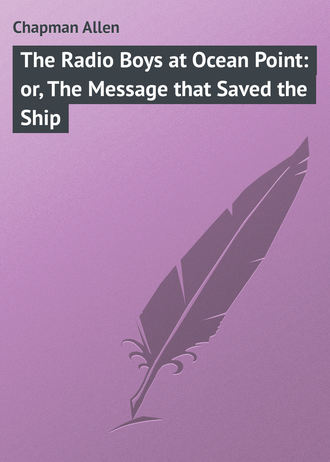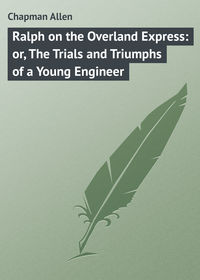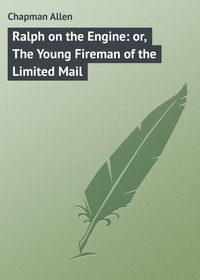 полная версия
полная версияThe Radio Boys at Ocean Point: or, The Message that Saved the Ship

Allen Chapman
The Radio Boys at Ocean Point Or The Message that Saved the Ship
In these days of Radio broadcasting, when the country has gone wild over wireless music and entertainment, there is a tendency to overlook the other phases of radio – such as its use as a means of saving life at sea, and for navigational purposes generally. There is no doubt about the interesting character of broadcasting, and equally, there is no doubt about the importance of radio as a means of life saving.
With this thought in mind, I think that the present volume, detailing the adventures of the Radio Boys, serves a very useful purpose in that it forcibly portrays the use of wireless to bring aid to a disabled ship on the high seas in a storm.
By doing this it will inculcate a desire among boys to learn the wireless code and transmit wireless telegraphy messages themselves, and in doing so will tend to develop that nucleus of communication experts in the coming generation, which is always an imperative necessity to every nation.
CHAPTER I – TAKEN UNAWARES
“Jiminy, but this is hot work!” exclaimed Bob Layton, as he laid down the hammer he was using and wiped his perspiring forehead.
“Hot is right,” agreed his friend, Joe Atwood, as he also took a moment’s breathing space. “You might almost think it was August instead of early June. Old Sol must have got mixed up in his calendar.”
“I’d call it a day and knock off right now if we were doing anything else,” remarked Bob. “But, somehow, when I get going on this radio business I can’t seem to quit. There’s something about this wireless that grips a fellow. Work seems like play.”
“Same here,” said Joe. “I guess we’re thirty-third degree radio fans all right. I find myself talking radio, thinking radio, dreaming radio. If there was any such thing as radio breakfast food I’d be eating it.”
“I’m afraid we’ll get thin if we wait for that,” laughed Bob, picking up his hammer and resuming work on the aerial that they were stringing on the top of his father’s barn. “But come along now, old scout, and get a hustle on. We’re going to finish this job to-day if it takes a leg.”
Joe stretched himself lazily.
“I hope it won’t come to that,” he replied. “I need both legs in my business.”
“Well, come along and shake a leg anyway,” counseled Bob. “I’m not asking you to lose one.”
“I’m glad we decided to make this aerial in umbrella shape,” remarked Joe, as, following his friend’s example, he set busily to work. “I think it has it all over the vertical one. We’ll be able to hear the messages from the broadcasting station a heap better than we ever did before.”
“I’m sure we shall,” returned Bob. “That’s the kind Doctor Dale is using on his set, and he tried both the vertical and the flat-top kind before he finally settled on this. It’s better for long-wave work. It stands to reason that since it has the greatest surface area it also has the greatest capacity. Then, too, the end of the antenna that has the greatest potential is nearest the ground. The doctor gave me a lot of dope about it that sounded reasonable. He knows by actual experience, and that’s better than all the theory in the world.”
“What Doctor Dale says goes with me all right,” replied Joe. “He’s never been wrong yet in any of the tips he’s given us. It’s funny, isn’t it,” he continued, as he deftly drove a nail, “that we’re never satisfied with what we’ve got in this radio work? That first set we put together looked pretty good to us at the time. Then the ones with which we won the Ferberton prizes looked a good deal better yet. But now here we are making it still better.”
“That’s the beauty of radio,” said Bob, with enthusiasm. “The surface of it hasn’t been more than scratched so far. It’s practically a brand new thing with a million features to be explored and countless improvements to be made. I suppose a few years from now we’ll be laughing at the instruments we’re using now. They’ll seem as old fashioned as the stage coach and the kerosene lamp. Some of the best brains in the world are working at it now, and there’s hardly a day that you don’t hear of something new in connection with it. It keeps you guessing all the time as to what will turn up next.”
“Right you are,” agreed Joe. “Did you read the other day about that man in Paris who runs his house by radio? You know they have a powerful radio outfit on the Eiffel Tower. That starts operations at six o’clock every morning. This fellow has rigged up things all over his house that are controlled by the waves that come from the tower. First the shutters fly open, then the curtains are drawn back, then electric heaters get into action and begin to make the coffee – ”
“Say,” interrupted Bob, turning to look at his friend, “what are you giving me? Trying to get me on a string?”
“Honest to goodness, I’m not trying to kid you,” replied Joe. “This is straight goods. The coffee begins to bubble in the percolator, the breakfast is started cooking, and the people are waked up by electric bells placed alongside their beds. If the weather is hot, the electric fans are started working.”
“Does it wash and dress the baby, too?” demanded Bob, with a laugh.
“I don’t know whether they’ve got as far as that yet,” replied Joe, with a grin; “but it starts a lullaby at night and sings the baby to sleep. It sure does wonders. There seems to be no limit to what it can be made to do.”
“We’ll have to tell Jimmy about that,” chuckled Bob. “Anything that will save work will make a hit with him. He’ll want to hitch it up so that it will saw wood for him and mow the front lawn. By the way, Joe, when did Jimmy say he’d be around? He promised to help us out with this.”
“He said he wouldn’t be able to get here before three,” replied Joe. “He had to go on an errand for his father. But to-day’s baking day at his house, and I smelled doughnuts cooking as I came past. Ten to one he’s filling up on those. That beats working on a roof in a hot sun.”
“I shouldn’t wonder if you were more than half right,” agreed Bob. “But what’s keeping Herb? He promised to help out on the job.”
“There’s company at his house,” explained Joe. “But he said he’d slip away as soon as he could and get over here.”
“Sounds mighty uncertain,” said Bob. “Looks like a case of doing it ourselves if we want it done. And it’s got to be done this afternoon. They’ve got a dandy program on at the broadcasting station to-night, and I don’t want to miss it.”
The two boys set to work with redoubled energy, despite the sweat that rolled down their faces and made them have frequent recourse to their handkerchiefs.
“What’s the idea of all those rocks down at the side of the barn, Bob?” inquired Joe, at the moment that his work brought him close to the edge of the roof.
“They’re for some repairing that dad’s going to do to the barn,” replied Bob. “The side of it has settled some, and he’s going to put in a new stone foundation. The old shebang needs a lot of fixing, anyway. The water pipes are rusty, and they’ll have to be replaced. He wants to get the place in shape before we go down to Ocean Point for the summer.”
“Ocean Point!” repeated Joe, with a sigh. “Why do you want to bring that up now when I’m dripping with sweat? It’s cruelty to animals. Say, Bob, what would you give just at this minute to be taking a dip in the briny? Just imagine yourself at the end of the pier with your hands above your head, ready to dive down into that cool green water, down, down, down, and feel it closing all around you and – ”
“Who’s cruel now?” groaned Bob. “Stop right where you are or I’ll throw something at you. Don’t you suppose I’m just as crazy as you to get down there? It’s only last night that I dreamed I was there. Oh, boy! The swimming, the fishing, the boating, the games on the sand, the – ”
“Radio,” suggested Joe.
“Righto!” agreed Bob. “That will be a new thing there that we’ve never had before. And instead of being in a hot, stuffy room, we can sit on the veranda, with the sea breeze blowing all around us, and the ocean stretched before us in the moonlight, and the lights of ships passing up and down the coast and – ”
“Back up,” laughed Joe. “You’re getting poetical. You could almost set that to music. But you’re dead right that it will be just what the doctor ordered to listen to a radio concert under such conditions. Where can we put up our radio set? In your cottage or mine, I suppose.”
“I’ve got an idea it would be a good thing to put it up in the community hall,” replied Bob. “Then everybody could enjoy it, and there’s a broader and bigger piazza there than any of the cottages have. We’re all like one big family there anyway.”
“That’s a dandy plan,” agreed Joe. “I shouldn’t wonder, too, if we caught a good many messages from ships while we are down there. Almost all the vessels now are equipped with wireless, and we ought to be able to listen in on lots of talk going on with the shore.”
“I only wish we could talk back to them,” said Bob. “I’m keen for the time when we can send messages, as well as listen in on them. But that will be possible, too, before the end of the summer. I’m studying up hard on the code and I know you are too, and we ought to be able to pass our examinations soon and get the right to have a sending station. But look who’s going down the street, Joe!” he exclaimed, interrupting himself suddenly.
Joe followed the direction of his glance and gave a grunt of disgust.
“Buck Looker and his bunch,” he remarked contemptuously. “Carl Lutz and Terry Mooney always trailing along with him! I wonder what low-down thing they’re cooking up now.”
“No knowing,” replied Bob carelessly. “They’ve steered pretty clear of us since we got back that set of Jimmy’s that they took. I have to laugh whenever I think of them rolling over and over in the dark and fighting each other when they thought they were fighting us.”
Joe laughed too at the recollection.
“We put one over on them then all right,” he agreed. “And I have to laugh, too, when I think how he crawled yesterday when you called him down in the school yard while he was bullying little Sam Ashton.”
“I didn’t want to soil my hands with him,” returned Bob. “I’d made up my mind never to speak to him again. But it made my blood boil when I saw the way he was tormenting a boy half his size and I had to interfere.”
“It did me good to see how he backed down,” chuckled Joe. “I really hoped he wouldn’t, for I wanted to see him get a good trimming. But Buck’s memory is good, and I guess he remembered the thrashing you handed him the night he was trying to wreck your aerial.”
“Perhaps,” laughed Bob. “I sure was sore at him that night and I guess I gave him good and plenty.”
“The pity of it was,” said Joe, “that nobody was around to see you do it. Ten to one he told his cronies afterward that it was he who licked you. But there was no mistake yesterday. Lutz and Mooney were standing close by and saw him take water. He turned fairly green with fright when he saw you double up your fists. You want to keep your eyes open, Bob, for he’ll try to get even by doing you a dirty trick whenever he thinks he can get away with it safely.”
“Let him try,” replied Bob indifferently. “That’s the least of my worries. What’s bothering me a good deal more now is why Jimmy and Herb haven’t turned up to help us out on this job.”
“Guess they’ve got stalled somewhere,” hazarded Joe. “But even if they don’t turn up we’ll be done in half an hour or so. Then it’s me for a cold bath and some dry clothes! I’m drenched to the skin.”
A half hour later there was no sign of the truants, but the job was done, and Bob and Joe ran their eyes over it with keen satisfaction.
“Some little mechanics, old scout!” chuckled Bob, slapping his friend on the shoulder. “Now for that cold bath you were – ”
He stopped suddenly and gave vent to an exclamation of surprise.
“What’s the matter?” queried Joe, who was adjusting his belt.
“The ladder!” exclaimed Bob. “It’s gone!”
Joe looked toward the edge of the roof, and saw that the top of the ladder by which they had mounted was no longer in sight.
“It must have fallen down,” he said; “but it’s queer we didn’t hear it.”
“Fallen nothing!” snorted Bob, as he crawled to the edge of the roof and looked over. “It was resting solidly against the roof when we left it, for I shook it with my hand to make sure. Somebody has taken it down. There it is lying on the ground, twenty feet away from the barn.”
“Now we’re in a nice fix!” exclaimed Joe, in dismay. “Have we got to stay here all the afternoon and be baked to a frizzle by this scorching sun? Call to somebody in the house, Bob.”
“That’s the worst of it,” replied Bob lugubriously. “Mother’s out calling to-day and there isn’t a soul at home.”
The boys looked at each other, and the same thought came into the minds of both.
“Buck Looker!” they exclaimed in one voice.
“That’s who it was,” declared Bob savagely. “He and his gang have done this. If we could see him, it follows that he could see us, and he thought he’d keep us up here broiling while he had the laugh on us. No doubt the whole crowd are hiding somewhere and watching us at this minute.”
“Well, they’re not going to make a show of us,” Joe almost shouted in his wrath. “I’m going to get down off this roof and I’m going to get down quick, ladder or no ladder.”
Before Bob could stop him he had grasped the water pipe that ran alongside the barn and started to slide down.
“Don’t! Don’t!” cried Bob, in alarm. “The pipe’s rusty! It’ll break! For the love of Pete – ”
His voice ended almost in a scream.
For at that moment what he feared happened.
The pipe broke beneath Joe’s weight. The lad felt it going and grabbed frantically at the upper part that was still fastened to the roof. He caught it and held on, his legs dangling in the air directly over the pile of rocks more than twenty feet below. To fall on those rocks meant broken limbs or death!
CHAPTER II – JUST IN TIME
At just the place in the pipe that Joe had grabbed there was a band running around it, perhaps a quarter of an inch thick. It was smooth and slippery, but yet gave more support to his clutching hands than would have been afforded by the pipe itself. To this precarious support poor Joe clung with desperation that was rapidly becoming despair as he felt his arms tiring and his hands slipping. A glance below had told him what awaited him if he fell on that pile of rocks.
Simultaneously with the breaking of the pipe Bob had flung himself at full length on the roof, with his arm extended over the edge. His feet felt around frantically and found a cleat in the roof in which he gripped his toes. Reaching as far as he could over the edge with one hand and holding on with the other, he found that he could just reach Joe’s hands with his own.
If the roof had been flat, he might have been able by sheer strength to pull his friend up. But it was sloping, and, as he lay, his feet were considerably higher than his head. So he had no purchase, no way to brace himself and pull upward. As it was, he had to dig his toes tightly against the cleat just to sustain the weight of his own body.
There was imminent danger that if he even grasped Joe’s hand the added weight would pull him over the edge of the roof. But this did not deter him for a second. He reached down and caught Joe around one of his wrists.
“I can’t pull you up, Joe,” he panted; “but I can hold on to you until help comes.”
He lifted up his voice to shout for help, when just at that instant Herb Fennington and Jimmy Plummer turned the corner of the barn. They were talking and laughing gaily together, but stopped short with a cry of alarm as they saw the terrible plight of their friends.
“Quick! Quick!” cried Bob. “Get the ladder and put it up. Quick!”
There was no need of his frantic adjuration, for Jimmy and Herb understood instantly the tragedy that impended. They ran for the ladder, and with some difficulty, for it was long and heavy, put it up alongside the barn and close to Joe’s swaying figure.
Then Herb, who was the stronger of the two, ran up the rungs until he was directly opposite his comrade.
“I’ll hold on to one arm, Joe,” cried Bob. “Let go the pipe with the other and give it to Herb.”
Joe did as directed and the two boys swung him over to the ladder. He felt for the rung with his feet, and when they were firmly planted on it, Herb placed one of his hands on another rung and Bob followed suit. Then while Jimmy held the ladder at the foot to keep it from slipping, Joe and Herb made their way slowly to the ground and Bob came after.
They seated Joe on a box that stood nearby, and his comrades crowded around him; joyful beyond words at his narrow escape, clasping his hands and slapping him on the back.
Joe was gasping under the muscular and nervous strain that he had undergone in the few minutes that had seemed to him like ages, but he rallied gamely and tried to joke.
“I said I was going to get down off that roof quick,” he said. “But I came mighty near coming down quicker than I wanted to. I can’t thank you fellows enough.”
And while they stand around him jubilating over his rescue, it may be well, for the benefit of those who have not read the preceding volume of this series, to tell who the Radio Boys were and what had been their adventures up to the time this story opens.
Bob Layton was a stalwart, vigorous youth of fifteen years, who lived in the thriving town of Clintonia, a city of about ten thousand population and located some seventy-five miles from New York City. His father was a prosperous druggist and chemist, esteemed and respected, and a leader in the civic life of the town. Bob was tall for his years, of dark complexion, with merry, flashing eyes. He was a leader in baseball, football, and the other athletic sports in which boys of his age delight. He was frank, truthful, courageous and a general favorite.
His special chum was Joe Atwood, son of a prominent doctor of Clintonia. Joe differed from Bob in being fair-skinned instead of dark. But the qualities of character of both boys were such as to make them close friends, and where one was to be found the other was seldom very far away. Joe, however, was impulsive, and his temper was of the “hair trigger” variety that required frequent curbing from his cooler-headed chum.
Of the many friends they had in town, the chief perhaps were Herbert Fennington and Jimmy Plummer. Herbert, or Herb, as he was usually called, was the son of a merchant, and was an easy-going, good-natured boy who was not especially fond of work, but who had an unusual liking for jokes and conundrums. He was slightly younger than Bob and Joe, but not enough to make much difference. Jimmy Plummer, the youngest of the four, was the son of a carpenter. He was jolly, fat, and round, with an appetite that made him the subject of good-natured jesting on the part of the other boys. He had been nicknamed “Doughnuts” because of his special fondness for that toothsome delicacy, and he did his best to live up to the name.
The boys were always much together, but of late their association had become still closer because of their common interest in the wonders of the wireless telephone. The marvelous features of this great invention had caught fast hold of their youthful imaginations, and they were soon so much absorbed in it that almost everything else was forgotten, or at least had to take second place.
Two things happened at almost the same time that increased their enthusiasm in this subject. One was a talk given to them on radio discoveries by Dr. Amory Dale, the pastor of the Old First Church of Clintonia, who had a scientific turn of mind and was most keenly interested in radio. The inspiration he gave them by his talk, together with practical object lessons on the making of radio sets, had an importance that could hardly be overestimated.
Shortly after this the member of Congress from the district in which Clintonia was included, Mr. Ferberton, offered prizes open for competition to all the boys of the district for the best radio sets made by the boys themselves. As the first prize was for a hundred dollars and the second for fifty, they were well worth trying for, and Bob, Joe, and Jimmy set to work in earnest to win one of them. Herb, owing to his natural indolence, did not enter into the competition, a circumstance that he afterward regretted.
They had a good many troubles and misadventures about this time, owing chiefly to the malice of Buck Looker, a bully of the town, who, together with his cronies, Carl Lutz and Terry Mooney, almost as bad as himself, did all they could to hinder the radio boys in their plans. Jimmy’s set was stolen by them on one occasion and on another Bob detected Buck trying to destroy his aerial at night, and gave the bully the trouncing that he richly deserved.
A curious accident that happened in the town opened to the boys a mystery that seemed difficult of solution and set their feet on the path of exciting adventures. How they rescued a girl whose automobile had run wild and dashed through the windows of a store, what they learned of her story and how they got on the track of a rascal who had swindled her, and what part the radio played in the unraveling of the plot, are narrated in the first book of this series, entitled: “The Radio Boys’ First Wireless; Or, Winning the Ferberton Prize.”
It did not take Joe long to recover from the shock he had had when he found himself suspended in midair over the rocks that had been gathered for the repairing of the foundation of the barn. Bob’s danger also had been great, and all felt that they had reason for being profoundly grateful over the happy outcome of the adventure.
“You just came in time, fellows,” said Bob. “Joe is no featherweight, and my arm was getting numb. A minute or two more and we’d both have had a tumble that I hate to think about.”
“That shows what good judgment we had in picking just the right time to come,” replied Jimmy, winking slily at Herb. “It takes some brains to be Johnny-on-the-spot just when you’re needed. Not a minute too late, not a minute too soon – that’s my motto.”
“I’ll admit that you took good care not to get here too soon,” replied Bob, with a laugh. “Where have you been all the afternoon? Why did you leave Joe and me to hold the bag?”
“Look at his pockets and you’ll find the answer,” said Joe, pointing to suspicious bulges in Jimmy’s jacket pockets.
“That’s all the credit a fellow gets when he tries to be generous,” complained Jimmy, in an aggrieved tone, as he emptied the pockets in question of half a dozen doughnuts. “Here I wait until the doughnuts are made so that I can bring along a lot for you fellows, and what do I get? Nothing but abuse. I was just crazy to help you fellows put up that aerial, but I sacrificed my own feelings and waited for the doughnuts so that you could have some.”
“Those doughnuts were cooking three hours ago,” retorted Joe.
“How do you know?” asked Jimmy.
“Because I smelled them as I came past your house,” replied Joe.
“Oh, that was the first batch,” explained Jimmy. “Most of those have gone by now.”
“What became of them?” grinned Bob.
“How do I know?” countered Jimmy. “My father and mother have pretty good appetites. Then of course I sampled one or two. Mother would have thought I didn’t like her cooking if I hadn’t. And if there’s anything I won’t do it’s to hurt my mother’s feelings. We never have more than one mother, you know,” he added virtuously.
“Sampled one or two!” sniffed Joe. “One or two dozen you mean.”
“How did you fellows come to get in such a fix?” queried Herb. “Did the ladder fall down?”
“It did not,” returned Bob with emphasis. “It was taken down while we weren’t looking by somebody who wanted to play a trick on us. And I can come pretty near to guessing who did it, too,” he added.
“Why not come right out with it?” said Joe, his face flushing with indignation. “It was Buck Looker and his gang who did it. I’m just as sure of it as though I had seen them. It’s no thanks to them that I’m not dead or a cripple this minute.”
“That explains something that Jimmy and I noticed just before we came up,” said Herb eagerly. “We saw Buck and Lutz hot-footing it down one street and Terry Mooney down another. I thought they were having a race around the block or something like that.”









